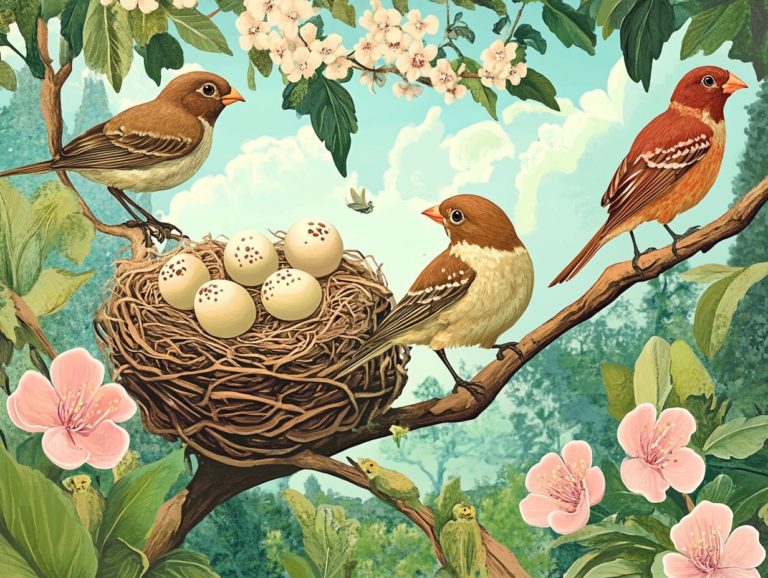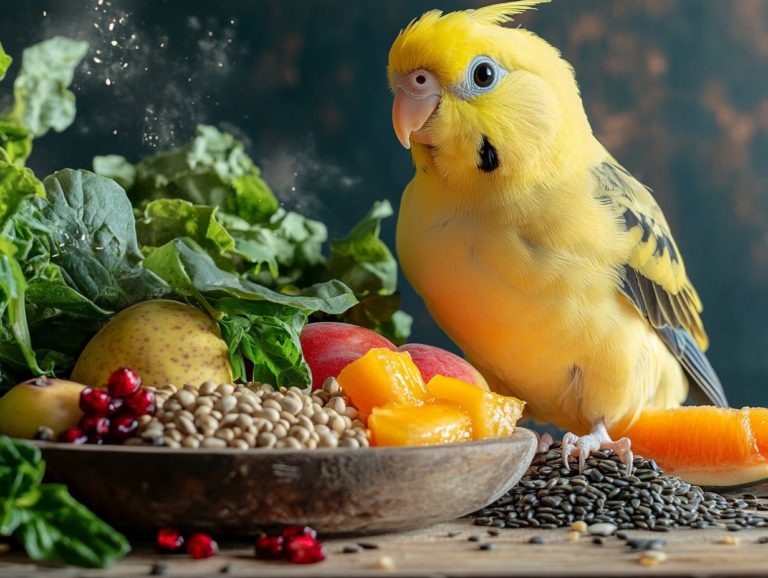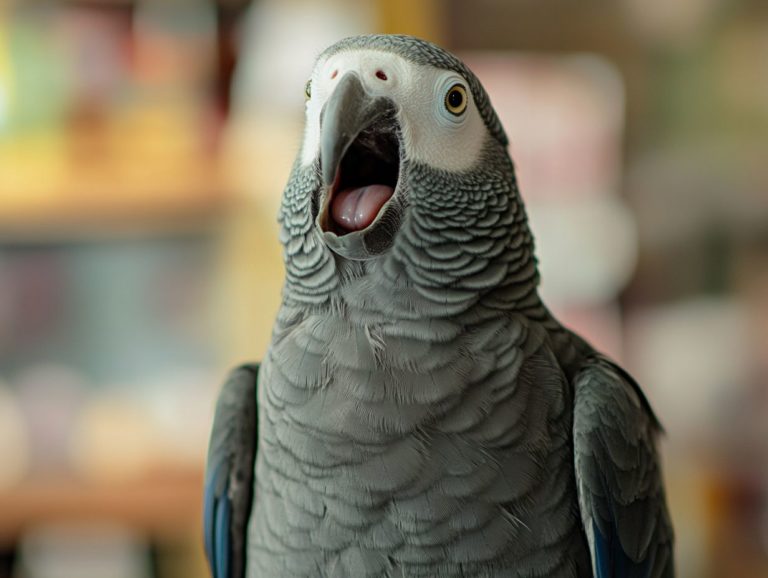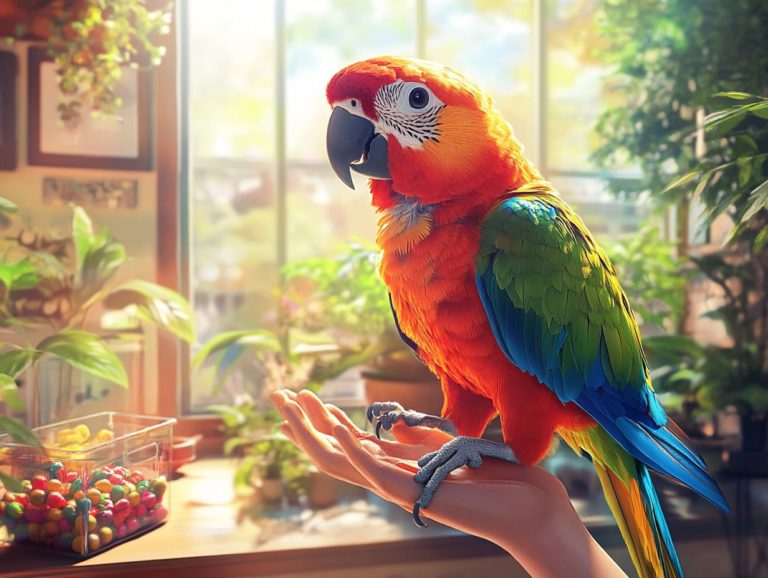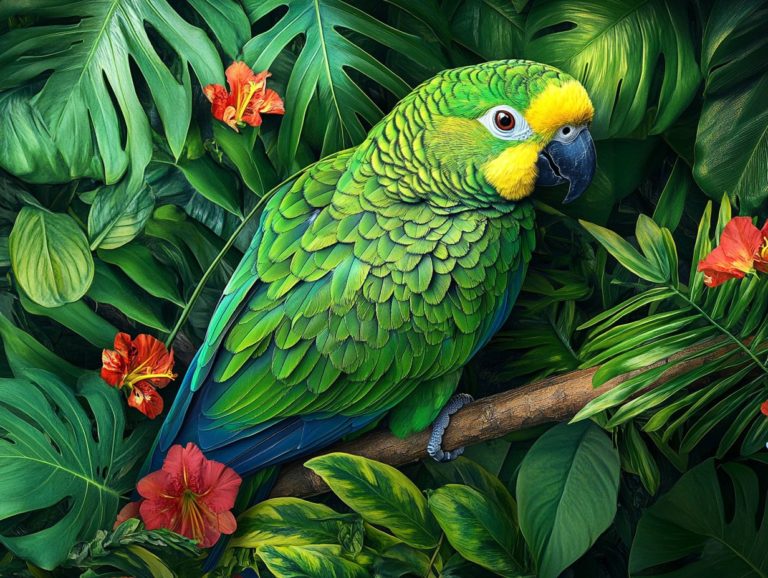10 Things to Know About Parrot Behavior
Parrots, including Macaws, African Greys, and Australian Cockatoos, are truly captivating companions, overflowing with personality and charm.
Owning one presents unique challenges and responsibilities that you must be prepared for. With their vibrant social lives and penchant for mischief, grasping parrot behaviors is essential for any bird enthusiast.
Get ready to discover ten essential tips that will transform your parrot experience! This guide addresses everything from their need for parrot care to their remarkable vocal talents.
Whether you re a seasoned pet bird owner or contemplating adding one to your home, this guide will equip you to navigate the delightful quirks and joys of parrot care.
Contents
- Key Takeaways:
- 1. Parrots Are Social Creatures
- 2. Parrots Can Be Noisy
- 3. They Need Mental Stimulation
- 4. Parrots Can Be Messy
- 5. They Have Strong Beaks
- 6. Parrots Can Be Aggressive
- 7. They Need Proper Nutrition
- 8. Parrots Can Be Escape Artists
- 9. They Can Mimic Human Speech
- 10. Parrots Can Live for Decades
- How Can You Tell If Your Parrot Is Happy and Healthy?
- Frequently Asked Questions
Key Takeaways:
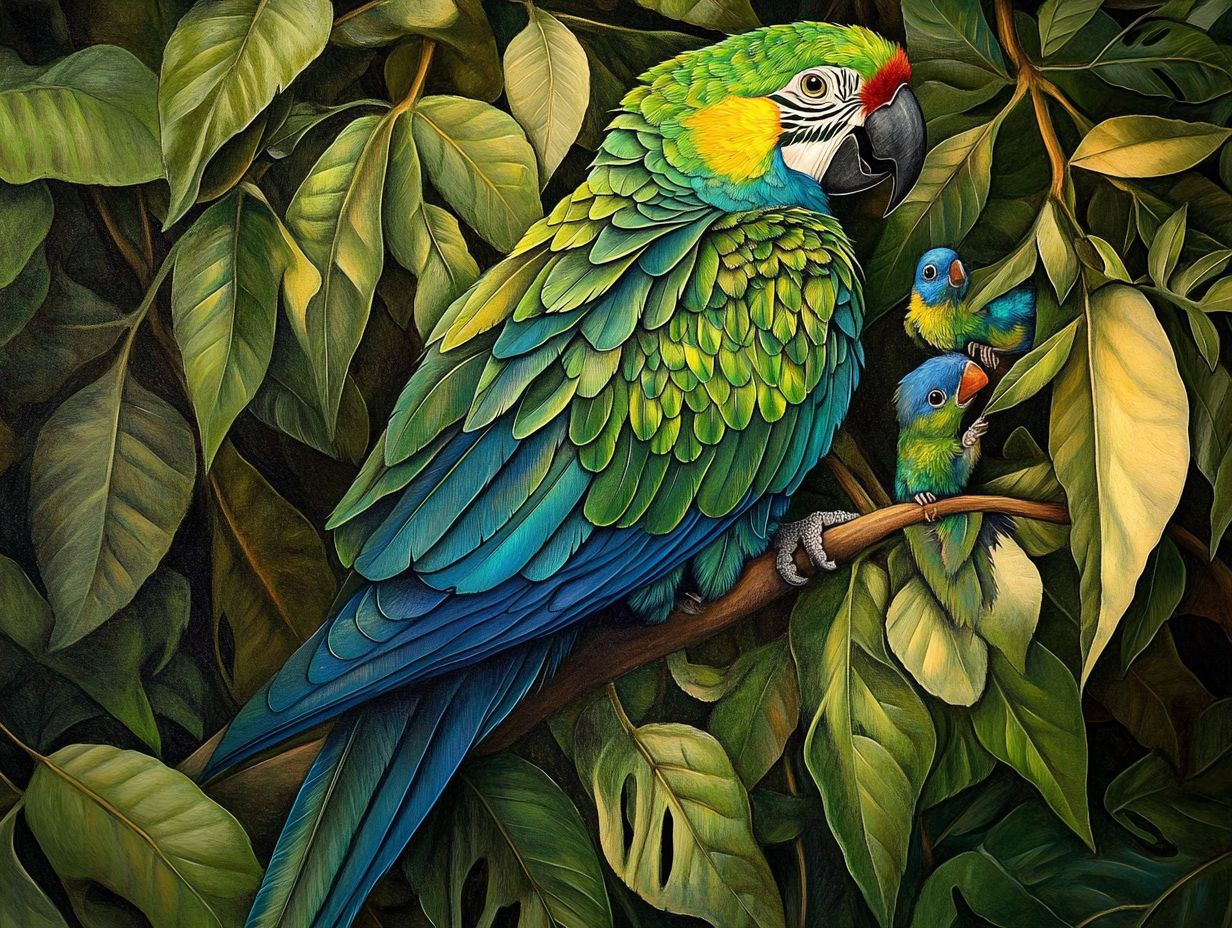
- Parrots are highly social creatures and need interaction with their owners and other parrots to thrive.
- Be prepared for noise if you have a parrot, as they can be quite vocal and loud.
- Mental stimulation is crucial for parrots, as they are intelligent animals and can become bored easily.
1. Parrots Are Social Creatures
Parrots, such as the charming Macaws, intelligent African Greys, and playful Australian Cockatoos, are inherently social beings that flourish on interaction and companionship.
If you re looking for a pet bird that offers a meaningful connection, these feathered friends are perfect for you. Their social nature not only enhances their well-being but also cultivates a unique bond between them and you.
To nurture this connection, engaging in regular interactions is vital. Think talking, singing, or playing games that stimulate their intellect and creativity.
Parrots often revel in activities like hide-and-seek or puzzle-solving, which you can easily customize to suit their interests. Provide opportunities for socialization with other birds. Arrange supervised playdates to enrich their experiences.
Creating a spacious cage filled with bird toys, perches at various heights, and safe chewing items is essential for a healthy and stimulating environment.
This setup allows these delightful companions to express their natural behaviors and emotions while forging a strong relationship with you.
2. Parrots Can Be Noisy
Parrots are well-known for their sounds, which can range from delightful chirps to loud squawks, making them some of the most boisterous pet birds around.
They communicate using a complex bird language that includes a variety of sounds and impressive vocal mimicry, reflecting the diverse ways wild parrots express themselves.
This distinctive form of communication serves multiple purposes. Whether it’s signaling excitement, establishing territory, or simply expressing their moods, each vocalization carries meaning.
Many species display unique vocal behaviors; for example, African Greys are celebrated for their exceptional mimicry skills, while Macaws are famous for their vibrant, raucous calls.
If you’re considering how to manage your pet’s volume, effective training techniques can be invaluable. With positive reinforcement and consistent routines, your parrot can learn to tone down excessive noise during certain times or in specific settings.
This transforms their loud outbursts into more manageable interactions, all while reflecting their naturally social nature.
3. They Need Mental Stimulation
To maintain your parrot’s mental health, it’s essential to provide ample mental stimulation. Engaging parrot toys, interactive games, and regular interaction with you can create a fulfilling experience for your feathered friend.
Consider incorporating various types of toys, such as foraging puzzles (toys that encourage your parrot to search and find treats) and chewable items, which can stimulate their natural instincts.
Activities like training sessions not only present challenges but also strengthen the bond between you and your parrot.
Behavioral consultants can be invaluable in crafting environments that encourage exploration and problem-solving, tailoring activities to fit each bird’s unique personality and needs.
By adopting this attentive approach, you foster an enriched atmosphere that greatly contributes to your parrot’s overall happiness, leading to lower stress levels and promoting healthy behaviors.
This, in turn, cultivates a more harmonious relationship between you and your pet.
Join the adventure of parrot ownership today! Your feathered friend is waiting for you!
4. Parrots Can Be Messy
Parrots can be quite the handful. Their feeding habits and playful antics create a mess think scattered seeds, feathers, and droppings. This makes diligent bird care essential for keeping a clean and pleasant environment for both you and your feathered friend.
This messiness arises from their natural instincts, like foraging and preening. These behaviors often lead to debris being scattered around their living space. To tackle this, establish regular cleaning routines. Utilizing safe cleaning products and designating specific play areas will go a long way in maintaining order.
Proper parrot care also involves offering a variety of dietary options that cater to their natural feeding behaviors. This can help reduce waste. Understanding bird physiology is key; keep in mind that parrots have fast digestion, meaning their droppings might be frequent. However, with smart dietary choices, you can manage this effectively.
Ultimately, this makes life more enjoyable for both you and your vibrant companion.
5. They Have Strong Beaks
Parrots come equipped with remarkably strong beaks, expertly designed for cracking nuts and seeds a reflection of their natural diets in the wild. This strength presents unique challenges for pet owners, who must consider the safety of both their parrots and household items.
Recognizing the power of a parrot’s beak is crucial for crafting a secure living environment. These amazing birds have a penchant for chewing, which can lead to unintentional damage. Your furniture, cables, and decorative pieces can quickly become enticing targets for those formidable jaws.
To mitigate potential destruction, it’s wise to implement protective measures. Provide designated chewing toys and ensure that any items within reach are bird-proofed. This strategy protects your things and keeps your parrot happy.
6. Parrots Can Be Aggressive
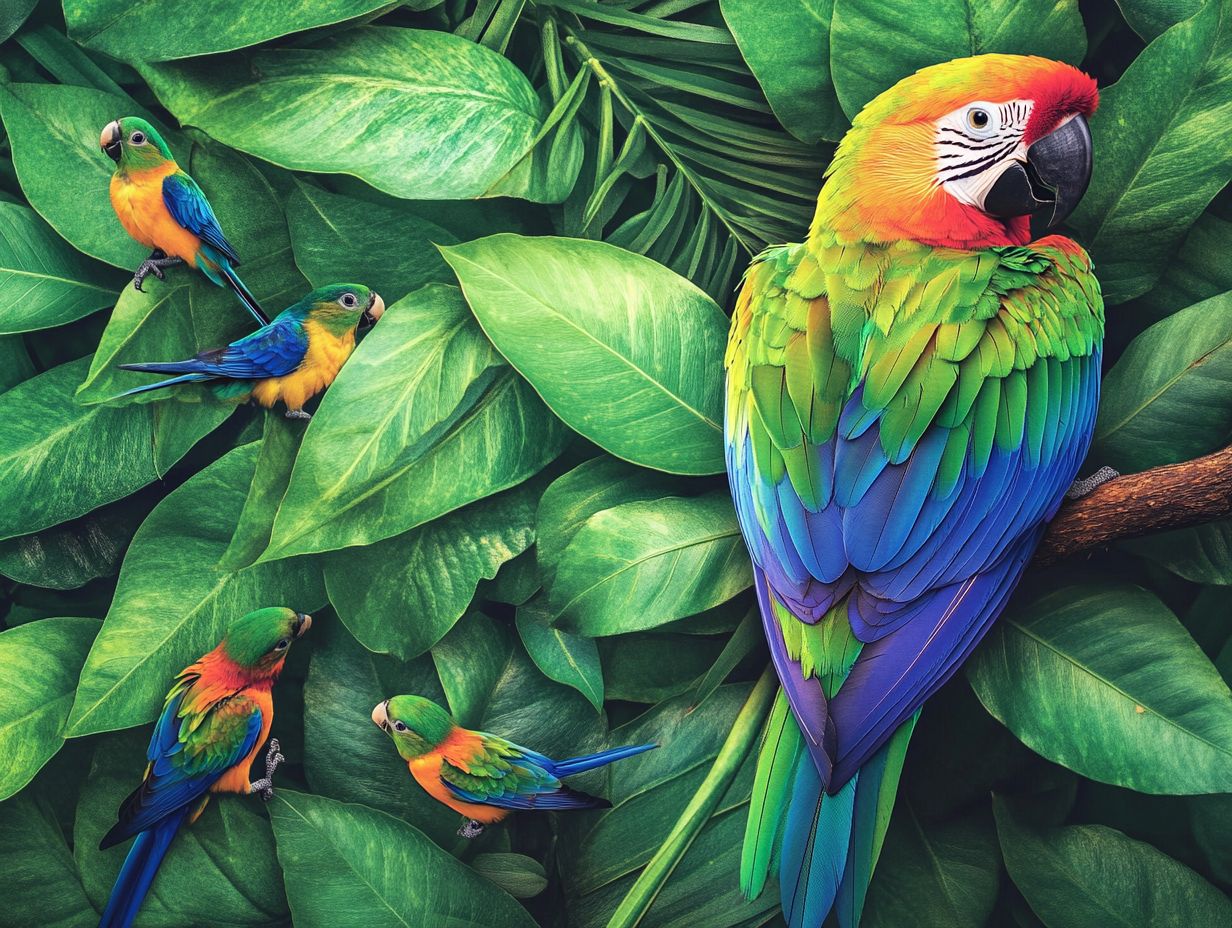
While parrots often display affectionate traits, they can also show aggressive behaviors, especially when they feel threatened or neglected. That s why it s essential for you, as a bird owner, to participate in training classes that focus on building a strong relationship and understanding parrot behavior.
Identifying triggers, such as changes in the environment, lack of interaction, or even the introduction of a new pet, can significantly help you address aggression. Employing training techniques that emphasize positive reinforcement like rewarding calm behavior with treats or praise can foster a more amiable temperament in your feathered friend.
Establishing routines and maintaining consistent communication are vital for cultivating a trusting relationship. This is crucial for minimizing aggressive outbursts. When you ensure that your parrot feels secure and valued, you enhance its overall well-being and enrich your own experience as a bird owner.
7. They Need Proper Nutrition
Proper nutrition is vital for your parrot’s health and happiness! Dietary needs can vary greatly between species. Don’t wait! Consult a bird doctor today to ensure your feathered friend receives a balanced diet that meets their specific nutritional needs, including high-quality bird food.
Recognizing that not all parrots thrive on the same diet is crucial. Some species may flourish with a diet rich in fruits and vegetables, while others might do best with a seed-based or pellet-rich regimen. It’s a common misconception that any combination of seeds or table scraps will suffice. This can lead to serious health problems down the line. Consulting with an avian vet can illuminate individual dietary needs and help you prevent nutritional deficiencies.
When selecting the right food, prioritize options that are species-specific and enriched with essential vitamins and minerals. Don t forget to incorporate a variety of fresh foods into their diet to promote overall well-being.
8. Parrots Can Be Escape Artists
Parrots are known escape artists, showcasing cleverness and agility that allow them to find ingenious ways to break free from enclosures. This highlights the importance of diligent bird care and using good safety practices to prevent common mishaps in pet bird care.
These feathered companions can squeeze through loose bars, unfasten locks, or even use their beaks to pry open doors. Make it a habit to check your cage often for any weaknesses and ensure that all securing mechanisms are in optimal condition to prevent your parrot from showcasing its escape artist skills.
Creating a safe environment involves removing hazardous items and securing windows and doors during free-flying sessions. Supervision is crucial during playtime because an unsupervised parrot could easily find itself in dangerous situations around the home.
By keeping a watchful eye, you not only protect their physical safety but also strengthen the bond between you and your feathered friend.
9. They Can Mimic Human Speech
One of the most captivating aspects of parrots is their remarkable ability to mimic human speech. This makes them not just charming companions but also intriguing conversationalists capable of developing an impressive vocabulary and even understanding elements of bird language. It opens up unique avenues for interaction between you and your feathered friend.
These vibrant birds boast advanced cognitive skills, meaning they can think and learn like us. This enables them to not only imitate sounds but also grasp contextual meanings. In terms of training, positive reinforcement techniques are often employed, rewarding your parrot for attempts to speak or respond. Over time, this approach fosters confidence and encourages further communication.
Mimicry is deeply rooted in their social behaviors; in the wild, parrots mimic calls to strengthen bonds within their flock. This inherent ability often deepens the connection between parrots and their human companions, transforming simple exchanges into rich interactions brimming with personality and emotion.
10. Parrots Can Live for Decades
Parrots are fascinating creatures known for their impressive longevity, with many species capable of living several decades. Some parrots can live over 80 years! This highlights your long-term commitment to providing lifelong avian care that adapts to their evolving needs over time.
As these intelligent beings age, their requirements for social interaction, diet, and environmental enrichment can shift significantly. For example, younger parrots often crave physical activity and mental stimulation, while older birds may need modifications to their habitat or specialized diets to support their health effectively.
By ensuring that your care practices evolve alongside their age, you not only contribute to their overall well-being but also strengthen the bond between you and your feathered companion, creating a more harmonious living situation throughout the parrot’s life.
How Can You Tell If Your Parrot Is Happy and Healthy?
Understanding how to identify if your parrot is happy and healthy is crucial for you as a bird owner. By observing key behaviors like vocalization, preening, and social engagement you can gain valuable insights into your parrot s well-being and overall happiness.
A well-cared-for parrot typically showcases bright, vibrant feathers along with a clean, plump appearance, both of which indicate that it’s receiving proper nutrition and care. Look for signs like playful interactions with toys or lively vocalizations; these are indicators of a mentally stimulated bird that feels secure in its environment.
Regular visits to an avian veterinarian are essential for you, as they can help detect any underlying health issues early, ensuring your parrot remains not just happy but also physically sound. By staying attentive to these signs, you can create a nurturing environment that helps your feathered friend thrive and radiate joy.
What Are the Different Types of Parrots and Their Behaviors?
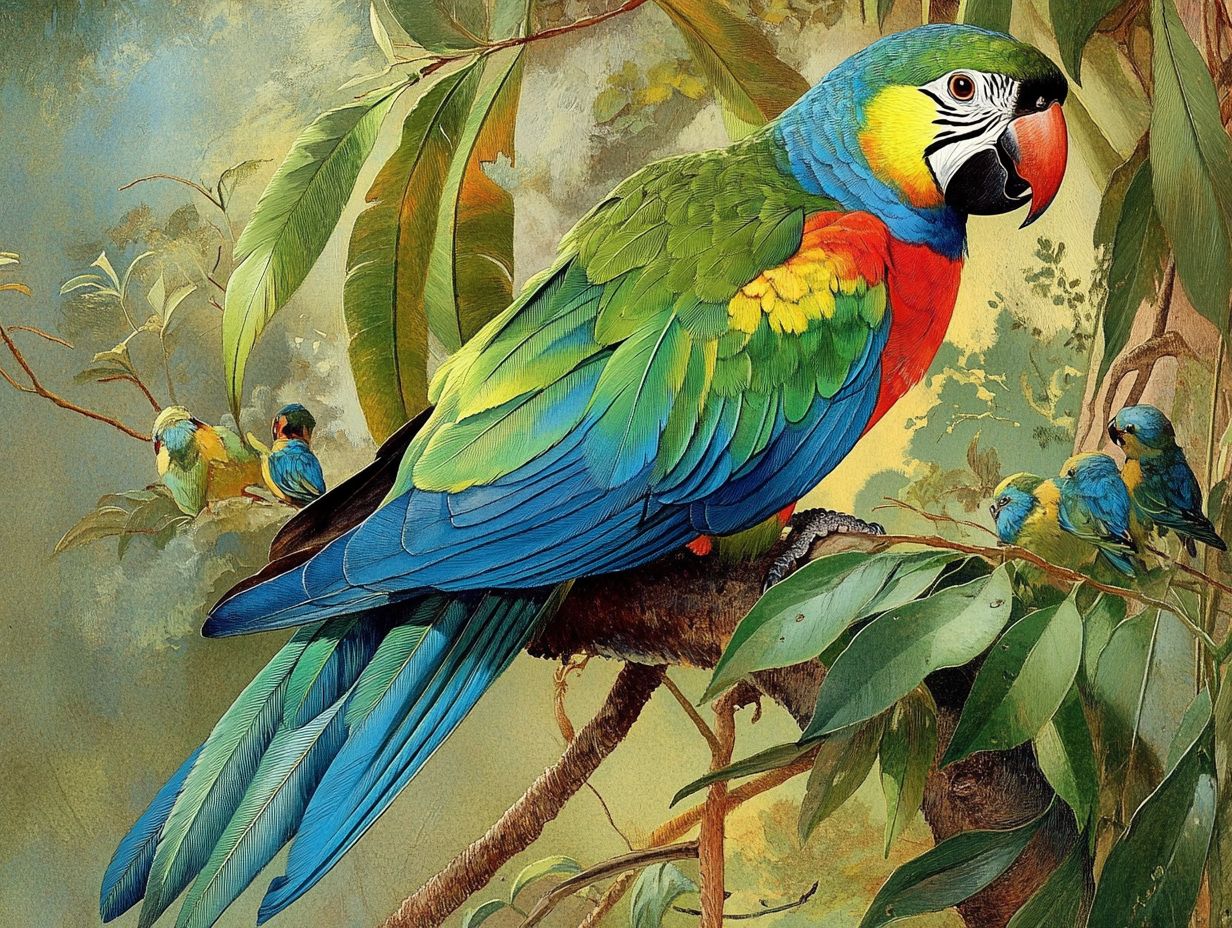
There are countless types of parrots, each with unique behaviors and traits shaped by their species and natural habitats. This diversity within aviculture emphasizes the importance of providing tailored care for every type.
Take Amazon parrots, for instance. They are renowned for their exceptional vocal abilities and playful personalities. They thrive in social settings where they can interact with both humans and fellow birds.
On the other hand, African grey parrots stand out for their remarkable intelligence. They master complex vocalizations and showcase impressive problem-solving skills, which means they require ample mental stimulation in their environments.
Then there are budgerigars, or budgies, celebrated for their friendly nature. You can often observe them playfully interacting in flocks, showcasing their social dynamics. Understanding these behavioral nuances enhances your bond with your parrot and ensures they receive the specific care and enrichment they need to flourish.
What Are Some Common Behavioral Issues in Parrots?
Like many pets, parrots can encounter common behavioral issues that often stem from stress, boredom, or inadequate training. Addressing these challenges requires proactive care strategies to effectively mitigate them.
You might notice these behavioral problems manifesting in various ways, such as biting, screaming, or feather plucking. Each one raises concerns for both you and your feathered friend. Understanding the root causes is essential, as they typically arise from a lack of mental stimulation or social interaction.
To foster a healthier environment for your parrot, consider implementing training techniques and behavioral modification strategies. Providing problem-solving toys, engaging in regular playtime, and using positive reinforcement when your parrot displays desirable behaviors can significantly boost their happiness and your bond!
How Can You Train Your Parrot to Behave?
Training your parrot to behave appropriately is essential for nurturing a harmonious bond with your feathered companion. Working with a behavioral consultant can elevate your training approach, providing effective strategies customized to your parrot’s unique temperament.
By exploring various training methods like reward-based training or clicker training you can uncover techniques that resonate with your parrot s learning style. Positive reinforcement is key; rewarding good behavior motivates your parrot to repeat those actions.
Consistency in your training is crucial. Regular practice not only solidifies desired behaviors but also establishes a structured environment.
Seeking professional guidance offers tailored insights that address specific challenges you may face. This ensures that you and your parrot navigate the learning process together smoothly, ultimately strengthening your bond over time.
What Are Some Tips for Bonding with Your Parrot?
Bonding with your parrot is a rewarding journey that enhances your feathered friend s happiness and enriches your experience as a bird owner. It s all about understanding their unique needs and engaging in interactive activities that foster trust and companionship.
Building that connection requires your consistent interaction and commitment. Regular training sessions can significantly strengthen the bond between you and your parrot. These sessions teach essential commands while providing a platform for positive reinforcement, helping your parrot feel secure and valued in your care.
Setting aside quality playtime is crucial for cultivating enjoyable moments of exploration and connection, making your parrot more comfortable in your presence. Remember to be patient and understanding. Every parrot builds trust at its own pace, so be ready for the journey!
Join our community of parrot lovers and share your experiences!
What Are Some Fun and Engaging Activities for Parrots?
To keep your parrot mentally stimulated and entertained, engaging activities are essential. Provide a variety of parrot toys and plan interactive games that challenge their intelligence while mimicking their natural behaviors.
By incorporating creative activities like puzzles that require problem-solving skills and foraging opportunities that simulate their instinctual hunting you can create an enriching environment for your bird. Social interactions that encourage bonding and play are equally important.
Introducing toys designed for exploration and thinking skills, such as those that can be shredded or manipulated, can keep your feathered friend engaged for hours on end.
Setting up playdates with other birds or scheduling time for them outside of their cage further replicates their wild habitat, allowing them to thrive in a stimulating atmosphere.
Frequently Asked Questions
Understanding Parrot Behavior
- Parrots are incredibly social and thrive on attention! They require a lot of interaction with their owners and pet bird companions.
- They are highly intelligent and need mental stimulation through toys, puzzles, and training, such as learning bird language.
- Parrots have a natural instinct to chew, so providing appropriate toys and perches, like bird toys specifically designed for pet birds, is important.
- While parrots can mimic sounds and speech, this does not mean they understand what they are saying; it s often a misconception among bird owners.
- Parrots need a varied and balanced diet consisting of pellets, fresh fruits, vegetables, and occasional treats to meet their nutritional needs.
- They thrive in a routine and can become stressed if their environment or daily routine changes suddenly, affecting overall care.
- Parrots are sensitive to their surroundings and can become territorial, so it s important to establish boundaries and rules early on.
- They have a natural instinct to fly and should be allowed time outside of their cage to stretch their wings and exercise.
- Parrots are social eaters and should be offered meals at the same time as their owners to encourage bonding.
- Regular grooming and hygiene maintenance, including trimming their nails and beak, is crucial for pet bird care.
Wondering how to stop your parrot from being aggressive?
There are a few key things to keep in mind. First, ensure your parrot has enough mental and physical stimulation to prevent boredom and frustration. Second, provide a consistent and predictable routine to avoid stress and anxiety. Finally, always handle your parrot with care and respect its boundaries. For more specific guidance, check out these 10 tips for training your African Grey, as it may become defensive if it feels threatened.
Why does my pet bird pluck its feathers?
Feather plucking can be a sign of various underlying issues such as boredom, stress, illness, or lack of proper nutrition. Observe your parrot’s behavior and consult with a veterinarian to determine the cause and address it accordingly.
Can I train my pet bird to do tricks?
Yes! Parrots are highly intelligent and can be trained to do various tricks and behaviors. Positive reinforcement training, using treats and praise, is an effective method. Be patient and consistent with training, and always prioritize your parrot’s well-being and comfort.
How do I introduce a new pet parrot to my home?
Introducing a new parrot should be done gradually and carefully. Start by placing the cage in a quiet area and allow it to get used to its new surroundings. Gradually increase interaction and supervised out-of-cage time to help the parrot become comfortable and familiar with its new home and family members.
Keep your parrot happy and healthy by engaging in fun activities! Explore more resources or share your experiences with your parrots to foster community engagement.
What Should I Do If My Pet Bird Bites Me?
When your parrot bites you, don’t react with fear or anger. This can make the biting worse.
Gently pull your hand away without showing fear and say a firm “no.” Find out why your bird is biting this might be a sign of discomfort or a lack of trust.
Observe your parrot’s behavior closely. If biting happens often, consult an animal behavior expert to help you understand your bird’s feelings!

